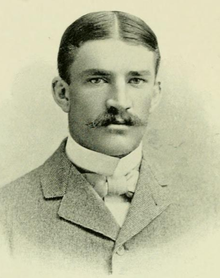 Dashiell pictured in Epitome 1898, Lehigh yearbook | |
| Biographical details | |
|---|---|
| Born | July 16, 1867 |
| Died | July 6, 1937 (aged 69) Annapolis, Maryland, U.S. |
| Playing career | |
| c. 1885 | St. Johns |
| 1886–1888 | Johns Hopkins |
| 1889, 1891 | Lehigh |
| Position(s) | Halfback |
| Coaching career (HC unless noted) | |
| 1892–1903 | Navy (assistant) |
| 1904–1906 | Navy |
| Head coaching record | |
| Overall | 25–5–4 |
Paul Joseph "Skinny" Dashiell (July 16, 1867 – July 6, 1937) was an American sportsman and educator. He was an influential figure in early American football, involved as a player, coach, referee, and administrator. Dashiell served as the second chairman of the Intercollegiate Rules Committee, the precursor to the National Collegiate Athletic Association (NCAA), from 1894 to 1911. During his leadership, the Rules Committee oversaw major reforms to the sport such as the abolition of the flying wedge and the adoption of the forward pass. While serving as the sport's top rulemaker, Dashiell continued to act as a leading referee. This created a lasting controversy which ultimately culminated in the college football crisis of 1905.
Dashiell played college football at Johns Hopkins University and at Lehigh University, and, in 1893, assisted Josh Hartwell in coaching football at Navy. Dashiell taught chemistry and mathematics at the Naval Academy.[1][2] A brother, Robert B. Dashiell, was a naval officer and ordnance expert.[3] He served as the head football coach at the United States Naval Academy from 1904 to 1906, compiling a record of 25–5–4.
Dashiell died on July 7, 1937, at the Navy Hospital in Annapolis, Maryland.[4][5]
- ^ "Army And Navy To Battle" (PDF). The New York Times. December 2, 1893. Retrieved October 27, 2011.
- ^ "'Skinny' Paul" (PDF). The New York Times. October 10, 1937. Retrieved October 27, 2011.
- ^ "Constructor Dashiell Dead". The Baltimore Sun. March 9, 1899. p. 6. Retrieved April 1, 2023 – via newspapers.com.
- ^ "Capt Paul Dashiell Dead In Annapolis". The Boston Globe. Boston, Massachusetts. Associated Press. July 7, 1937. p. 15. Retrieved June 30, 2021 – via Newspapers.com
 .
.
- ^ "Capt. P. J. Dashiell Dies In Annapolis" (PDF). The New York Times. July 7, 1937. Retrieved October 27, 2011.